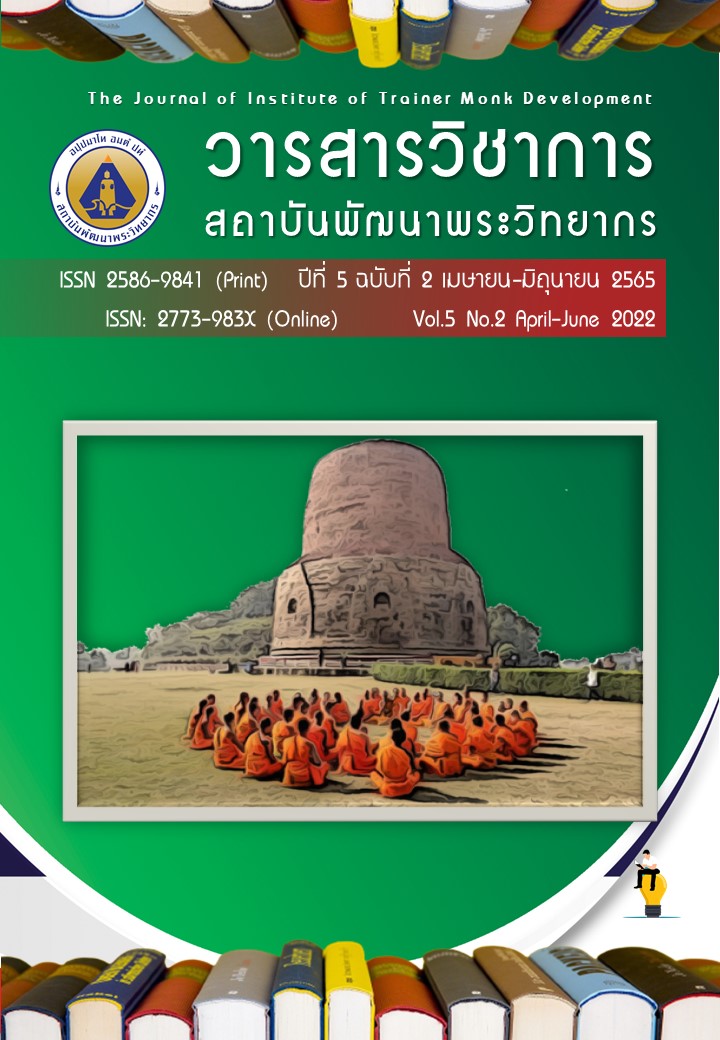ศึกษาวิเคราะห์ปรัชญาทางสังคมและการเมืองเชิงพุทธในสังคมไทย
Main Article Content
บทคัดย่อ
บทความวิชาการเรื่องนี้ มีวัตถุประสงค์เพื่อศึกษาปรัชญาทางสังคมและการเมืองเชิงพุทธที่มีอิทธิพลต่อสังคมในเชิงปฏิบัติและมีผลต่อเนื่องจนถึงการบริหารในระบบของการเมืองการปกครองในสังคมไทย ด้วยการศึกษาเอกสารและหนังสือ ผลการศึกษาพบว่า ปรัชญาทางสังคมเชิงพุทธเป็นการกล่าวถึงลักษณะการอยู่ร่วมกันของสังคมที่เน้นความสงบและการสร้างการยอมรับหลักธรรมเป็นหลักการในการอยู่ร่วมกัน เมื่อเผชิญหน้ากับปัญหาก็จะหันเข้ามาแก้ไขด้วยระบบที่เป็นธรรม ขณะที่ปรัชญาการเมืองเชิงพุทธ เป็นการกล่าวถึงลักษณะของผู้นำที่ต้องมีคุณธรรมเป็นองค์ประกอบ เนื่องจากผู้นำทางการเมืองนั้นจะมีอำนาจเบ็ดเสร็จเด็ดขาด พระพุทธศาสนามองว่าผู้นำนั้นสามารถทำให้ผู้ตามประสบความสุขก็ได้ ประสบความทุกข์ก็ได้ การสร้างผู้นำที่มีอยู่คนเดียวนั้นง่ายกว่าจะสร้างคนจำนวนมากให้มีคุณธรรมไปพร้อมกันได้ ผู้นำจึงต้องมีหลักธรรมในการพัฒนาตนเอง ฉะนั้น ปรัชญาสังคมและการเมืองเชิงพุทธในสังคมไทยจึงเป็นการมองระบบของสังคมที่เน้นการอยู่ร่วมกันอย่างมีความสุข และผู้นำที่มีหลักคุณธรรมเป็นพื้นฐานในการปกครอง
Article Details

อนุญาตภายใต้เงื่อนไข Creative Commons Attribution-NonCommercial-NoDerivatives 4.0 International License.
บทความที่ได้รับการตีพิมพ์เป็นลิขสิทธิ์ของวารสารวิชาการสถาบันพัฒนาพระวิทยากร
ข้อความที่ปรากฎอยู่ในบทความที่ได้รับการตีพิมพ์ในวารสาร ถือเป็นความรับผิดชอบของผู้เขียนบทความ และข้อคิดเห็นนั้นไม่ถือว่าเป็นทัศนะและความรับผิดชอบของกองบรรณาธิการวารสารวิชาการสถาบันพัฒนาพระวิทยากร
เอกสารอ้างอิง
สมภาร พรมทา. (2539). ปรัชญาสังคมและการเมือง. พิมพ์ครั้งที่ 2. กรุงเทพมหานคร: สำนักพิมพ์
จุฬาลงกรณ์ มหาวิทยาลัย.
วิทยากร เชียงกูล. (2552). ปรัชญาการเมือง เศรษฐกิจ สังคม. พิมพ์ครั้งที่ 3. กรุงเทพมหานคร: สายธาร.
เกษฎา ผาทอง และธีรภัทร เสรีรังสรรค. (2561). พระพุทธศาสนากับการเมืองในสังคมไทย. วารสารวไลยอลงกรณปริทัศน (มนุษยศาสตรและสังคมศาสตร). 8(1), หน้า 195-207.
กมล สมวิเชียร. (2516). ประชาธิปไตยกับสังคมไทย. กรุงเทพมหานคร: ไทยวัฒนาพานิช.
สุภาพรรณ ณ บางช้าง. (2535). ขนบธรรมเนียมประเพณี: ความเชื่อและแนวการปฏิบัติในสมัยสุโขทัย ถึงสมัยอยุธยาตอนกลาง. กรุงเทพมหานคร: โครงการเผยแพร่ผลงานวิจัย ฝ่ายวิจัยจุฬาลงกรณ์ มหาวิทยาลัย.
มหาจุฬาลงกรณราชวิทยาลัย. (2539). พระไตรปิฎกภาษาไทย ฉบับมหาจุฬาลงกรณราชวิทยาลัย. กรุงเทพมหานคร: โรงพิมพ์มหาจุฬาลงกรณราชวิทยาลัย.
จักษ์ พันธ์ชูเพชร. (2549). การเมืองการปกครองไทยจากยุคสุโขทัยสู่สมัยทักษิณ. พิมพ์ครั้งที่ 5. กรุงเทพมหานคร: บริษัท มายด์ พับลิชชิ่ง จำกัด.
จำนงค์ อดิวัฒนสิทธิ. (2564). ปรัชญาทางสังคมแห่งพระพุทธศาสนา. นนทบุรี: หจก.นิติธรรมการพิมพ์.
ชลทิศ ธีระฐิติ. (2551). การพัฒนาทรัพยากรมนุษย์. นนทบุรี: สำนักพิมพ์มหาวิทยาลัยสุโขทัยธรรมาธิราช.
เอก ตั้งทรัพย์วัฒนา. (2551). คำและความคิดในรัฐศาสตร์ร่วมสมัย เล่ม 2. กรุงเทพมหานคร: วี. พริ้นท์.
พระธรรมปิฏก (ป.อ.ปยุตฺโต). (2551). กระบวนการเรียนรู้เพื่อพัฒนาคนไปสู่ประชาธิปไตย. กรุงเทพมหานคร: โรงพิมพ์มหาจุฬาลงกรณราชวิทยาลัย.
พระธรรมปิฏก (ป.อ.ปยุตฺโต). (2546). สลายความขัดแย้ง: นิติศาสตร์-รัฐศาสตร์-เศรษฐศาสตร์แนวพุทธ. กรุงเทพมหานคร: โรงพิมพ์ บริษัท สหธรรมิก จำกัด.
ทวีศักดิ์ ตั้งปฐมวงศ์. (2546). การเปลี่ยนแปลงการปกครอง 2475: การปฏิวัติที่ถูกนิยามใหม่ The Changing of the ruling in 1932: The new definition revolution. วารสารมหาวิทยาลัยมหาสารคาม. ๓๑(๓).
Copelend, L. & Lawrence, L. (Eds.). (1985). The World’s Great Speeches. 2nd ed. New York: Dover.
Charnow, A. B. & Vallasi, G. A. 1993). “Democracy” in the Illustrated” The Coliumbia Encyclopedia. 5thed. Edited by Babara A. Charnow. A. and George Vallasi. Coliumbia: Coliumbia University.
Bertrand, D. J. Defining and Measuring Political. (1991). In Democracy and Human Rights in Developing Countries. London: Lynne Rienner.


